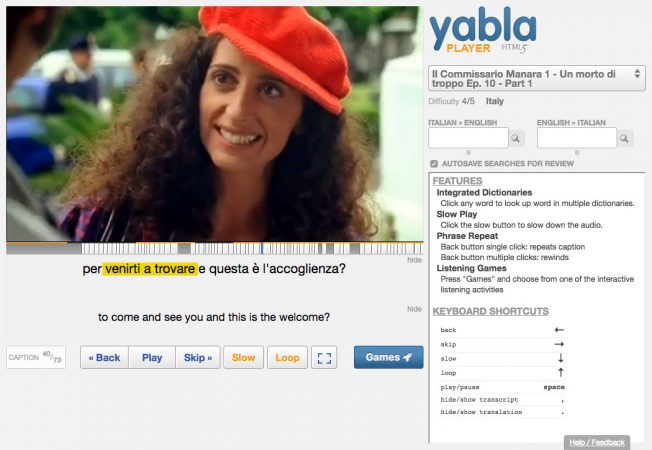Ciao a tutti!
Those of you who have studied with Pimsleur will recognize this week’s phrase as we continue to study our episode of Il Commissario Manara as it appears on Yabla. In fact, this phrase appears relatively early in the Pimsleur lessons. Here it is:
venire a trovare (or andare a trovare)
to come to visit (to go to visit)
or more literally:
venire a trovare
to come to find
Last week Luca was surprised by Teresa, who has come to visit him. He says:
Teresa, ma che ci fai qua? Ma che sei pazza?
Teresa, but what are you doing here? But what are you crazy?
to which Teresa replies:
Allora, mi sono fatta dodici ore di treno per venirti a trovare e questa è l’accoglienza?
So, I did twelve hours on the train to come to visit you and this is the welcome?
So, what about this phrase is going to give you trouble? Well, the pronoun of course! When there are two infinitives like this, is it:
venirti a trovare
or
venire a trovarti?
Well, it depends on who you talk to! Both are used in spoken language, and are more or less common depending on the region of Italy you are visiting. My advice is to pick one and just stick with it. The native Italians I’ve spoken to tend to prefer venire a trovarti, with the pronoun attached to the last infinitive. It sounds better to their ears. So, I’ve personally chosen to stick with that.
You will also sometimes hear the pronoun placed in front of both verbs, like this:
La famiglia ti viene a trovare.
The family is coming to visit you.
Don’t worry about learning every different way of saying it. Pick one. Just be aware of the others so that when you hear them, you’ll understand.
Here are some more examples in context:
Vedi che bravo figlio, che viene a trovare la mamma.
Look what a good son, that comes to visit his mother.
Tua madre viene a trovarti domani?
Is your mother coming to visit you tomorrow?
Ti spiace se vengo a trovarti?
Do you mind if I visit you?
Ecco perché nessuno viene a trovarla.
That’s why nobody comes to visit her/you (formal)
Lei è l’unica che viene a trovarlo.
She is the only one that comes to visit him.
Non vieni mai a trovarci.
You never come to visit us.
Of course, you are not limited to coming to visit, you can also go to visit.
E a volte mi rendo conto che le persone mi stanno pensando, per cui vado a trovarle.
And sometimes I realize that people are thinking of me, so I go visit them.
Sono solo andata a trovarlo all’ospedale poche volte.
I only went to visit him in the hospital a few times.
Now, to learn, you really need to express your own thoughts. I can’t stress this enough. Once you have used a phrase to express your own thoughts a few times it becomes much easier to remember. So, how can you take what you’ve learned here and express your own thoughts?
Do you have a trip planned? Who are you visiting? How would you tell this to a friend? How could you greet your friend when you got there? Or maybe you’re visiting someone in the hospital? Or you want to see a friend that you haven’t seen in a while? How do you tell them you’re coming?
Let us know on Facebook how you used this phrase in context!
Yabla Italian is an excellent tool to help you develop an ear for spoken Italian. (I use Yabla personally to study three different languages.) With Yabla Italian you will have:
- verbatim subtitles in Italian
- access to English subtitles when you need them
- the ability to turn the subtitles off as you improve
- quizzes to gauge how well you’re doing
And… this is especially useful… you can slow the video down! Yes! We all know how fast the Italians talk. You know a lot of the words. If you just had a little more time to process them…. Well, now you do!
If you feel your Italian is good enough to watch without Italian (or English) subtitles, this episode of Il Commissario Manara is also available for free from RAI. You will need to fast forward to exactly 48 minutes for the start of Un morto di troppo.




2 Comments
Midge Guerrera
June 13, 2017 - 1:38 pmLisa, I should have visited your site sooner! I am looking forward to exploring and learning. I live in a small southern Italian town a good part of the year and NJ the rest of the time. Thanks for all you do to help the language grow.
Lisa
June 14, 2017 - 8:29 amCiao Midge! I took a look at your blog. Very nice! If you’re ever in the northern part of NJ, come join us.